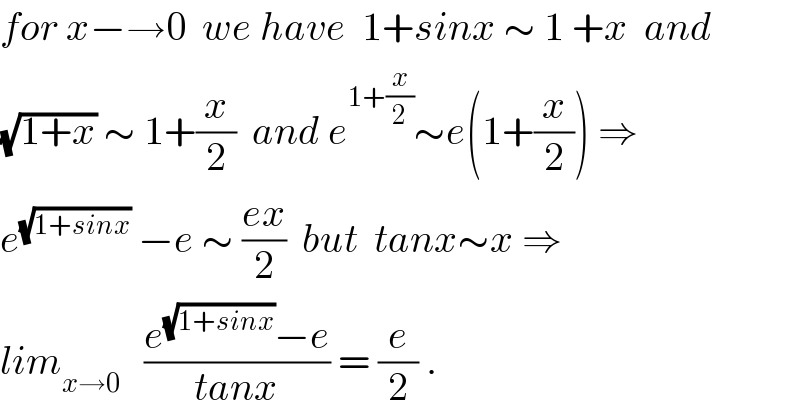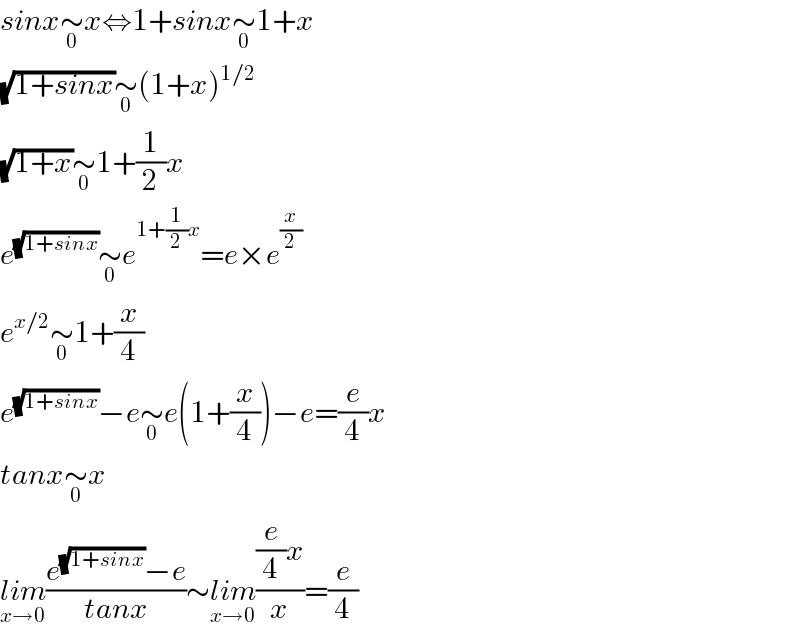
Question Number 29460 by prof Abdo imad last updated on 08/Feb/18

$${find}\:\:\:{lim}_{{x}\rightarrow\mathrm{0}} \:\:\:\:\frac{{e}^{\sqrt{\mathrm{1}+{sinx}}} \:\:−{e}}{{tanx}}. \\ $$
Answered by Cheyboy last updated on 09/Feb/18

$$\underset{{x}\rightarrow\mathrm{0}} {\mathrm{lim}}\frac{{e}^{\sqrt{\mathrm{1}+\mathrm{sin}\:{x}}} −{e}}{\mathrm{tan}{x}}=\mathrm{0} \\ $$
Commented by prof Abdo imad last updated on 22/Feb/18

$${for}\:{x}−\rightarrow\mathrm{0}\:\:{we}\:{have}\:\:\mathrm{1}+{sinx}\:\sim\:\mathrm{1}\:+{x}\:\:{and} \\ $$$$\sqrt{\mathrm{1}+{x}}\:\sim\:\mathrm{1}+\frac{{x}}{\mathrm{2}}\:\:{and}\:{e}^{\mathrm{1}+\frac{{x}}{\mathrm{2}}} \sim{e}\left(\mathrm{1}+\frac{{x}}{\mathrm{2}}\right)\:\Rightarrow \\ $$$${e}^{\sqrt{\mathrm{1}+{sinx}}} \:−{e}\:\sim\:\frac{{ex}}{\mathrm{2}}\:\:{but}\:\:{tanx}\sim{x}\:\Rightarrow \\ $$$${lim}_{{x}\rightarrow\mathrm{0}} \:\:\:\frac{{e}^{\sqrt{\mathrm{1}+{sinx}}} −{e}}{{tanx}}\:=\:\frac{{e}}{\mathrm{2}}\:. \\ $$
Answered by sma3l2996 last updated on 09/Feb/18

$${sinx}\underset{\mathrm{0}} {\sim}{x}\Leftrightarrow\mathrm{1}+{sinx}\underset{\mathrm{0}} {\sim}\mathrm{1}+{x} \\ $$$$\sqrt{\mathrm{1}+{sinx}}\underset{\mathrm{0}} {\sim}\left(\mathrm{1}+{x}\right)^{\mathrm{1}/\mathrm{2}} \\ $$$$\sqrt{\mathrm{1}+{x}}\underset{\mathrm{0}} {\sim}\mathrm{1}+\frac{\mathrm{1}}{\mathrm{2}}{x} \\ $$$${e}^{\sqrt{\mathrm{1}+{sinx}}} \underset{\mathrm{0}} {\sim}{e}^{\mathrm{1}+\frac{\mathrm{1}}{\mathrm{2}}{x}} ={e}×{e}^{\frac{{x}}{\mathrm{2}}} \\ $$$${e}^{{x}/\mathrm{2}} \underset{\mathrm{0}} {\sim}\mathrm{1}+\frac{{x}}{\mathrm{4}} \\ $$$${e}^{\sqrt{\mathrm{1}+{sinx}}} −{e}\underset{\mathrm{0}} {\sim}{e}\left(\mathrm{1}+\frac{{x}}{\mathrm{4}}\right)−{e}=\frac{{e}}{\mathrm{4}}{x} \\ $$$${tanx}\underset{\mathrm{0}} {\sim}{x} \\ $$$$\underset{{x}\rightarrow\mathrm{0}} {{lim}}\frac{{e}^{\sqrt{\mathrm{1}+{sinx}}} −{e}}{{tanx}}\sim\underset{{x}\rightarrow\mathrm{0}} {{lim}}\frac{\frac{{e}}{\mathrm{4}}{x}}{{x}}=\frac{{e}}{\mathrm{4}} \\ $$
Commented by prof Abdo imad last updated on 22/Feb/18

$$\:{for}\:{u}\:\in{v}\left(\mathrm{0}\right)\:\:{e}^{{u}} \:\sim\:\mathrm{1}+{u}\:{so}\:{e}^{\frac{{x}}{\mathrm{2}}} \sim\mathrm{1}+\frac{{x}}{\mathrm{2}}\:\:. \\ $$
Commented by sma3l2996 last updated on 22/Feb/18

$${Yeah},\:{you}'{re}\:{right} \\ $$
